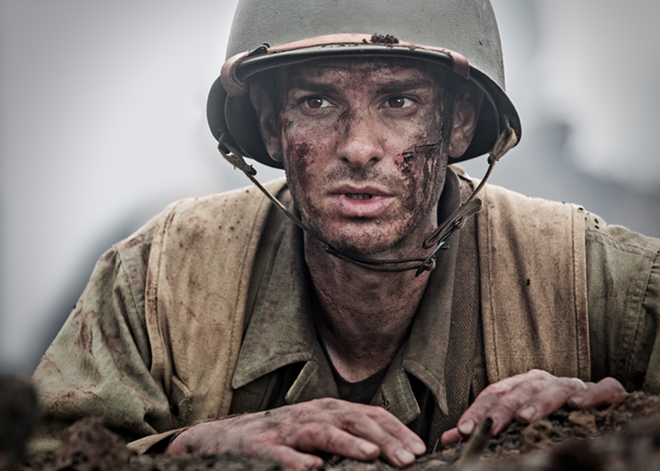It's safe to say that Hacksaw Ridge is the goriest, grisliest, most gruesome film ever made about a pacifist. It's also no probably coincidence that it shares a director with the movie that most readily comes to mind as runner-up in that dubious category: The Passion of the Christ.
Mel Gibson's first film as a director in 10 years tells the true story of Desmond T. Doss, played here by Andrew Garfield in a command performance. Doss was an Army medic and Seventh-day Adventist who, in 1945, became the first conscientious objector to receive the Medal of Honor in recognition of his heroism for single-handedly carrying 75 wounded soldiers to safety during the almost unthinkably bloody Battle of Okinawa.
Notably, the film also marks Gibson's bid to return to mainstream Hollywood respectability after a decade spent in the hinterlands of public disgrace, following a series of high-profile incidents that earned him a reputation as anti-Semitic, racist, homophobic, alcoholic and generally cuckoo for Coco Puffs. In that respect, the gamble appears likely to pay off. Rather than dense melodramas performed entirely in dead languages — as both Passion and his largely overlooked and criminally underrated Apocalypto were — Gibson here offers a deeply sentimental and more-or-less conventional war picture that should connect with mainstream audiences and, despite its R rating, possibly cross over to the Christian market that made unexpected blockbusters out of films like Heaven is for Real and God's Not Dead.
Indeed, for the first hour of the film's 2 hour, 18 minute running time, Gibson offers such an anachronistically old-fashioned tale that it veers at times almost toward camp. We see the events that shaped the young Doss' views on violence — the abusive, alcoholic father (Hugo Weaving) who was broken by his experience in the Great War and the youthful scrapping that nearly led Desmond to kill his brother accidentally when both were children. We see his sweetly innocent courtship of the beautiful nurse Dorothy (Teresa Palmer), whose picture and Bible would be his most valued possessions amid the fog of war.
And we see the de rigueur training camp section of the film, which comes across like Full Metal Jacket as Stan Lee and Jack Kirby might have sanitized the material in the pages of Sgt. Fury and his Howling Commandos. Doss' unit features the perennial cornball gallery of G.I. archetypes — the Italian, the Jew, the short one, the tall one, the ladies' man, the redneck, the Brooklyn tough — because of course it does. And in one of his best roles in years, Vince Vaughn plays against type as the barking drill sergeant who must whip these boys into shape.
Needless to say, Doss' pacifism represents a bit of a hitch toward achieving that goal. A man who won't even touch a gun does not appear to have an obvious place on the battlefield. A series of commanding officers try every trick in the book to eject him from the service — psychiatric disqualification, intense hazing and, ultimately, court-martial — but he refuses either to compromise his beliefs or to go home.
If the film's first half is about what happens when a man of faith has his principles challenged, its second half is about what happens when he is literally thrust into hell on earth. One can question Gibson's fixation as a filmmaker — going all the way back to Braveheart — on incredibly graphic violence, and particularly on the role of painful personal suffering as an ennobling force. What is not in question is that, when it comes to the spectacle of cinematic violence, he remains among the best there is. The scenes are frenetic and exhilarating, but impeccably staged. We never lose track of what's happening and where we are, even as the theatre's sound system shakes and every inch of the screen is filled with gunfire, explosions and flamethrowers, as well as viscera, blood, brains and body parts.
Gibson occasionally slips into his tendency toward self-indulgence, echoed in the heavy handed score by composer Rupert Gregson-Williams. The film's conspicuous othering of the Japanese as sneaky and ruthless monsters — though certainly appropriate for the public attitudes of the period — also comes across as somewhat problematic, particularly given the filmmaker's personal history on these sorts of issues.
But on balance, Hacksaw Ridge does exactly what it was meant to do: Demonstrate that, while Mel Gibson may never again be the blockbuster movie star he once was, the man is still a damned talented filmmaker.
Hacksaw Ridge
3.5 out of 5 stars
Rated R. Directed by Mel Gibson.
Starring Andrew Garfield, Sam Worthington, Luke Bracey.
Opens Nov. 4.


